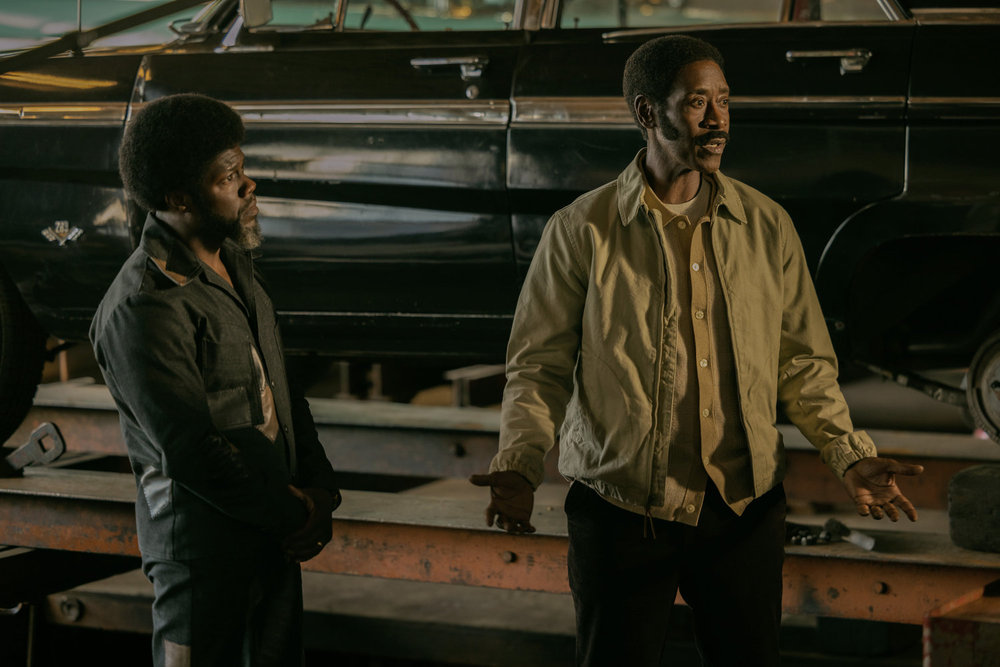Unraveling the intricate heist in “Fight Night: The Million Dollar Heist”
Series final reveal: A masterful twist
In the sixth and climactic episode of “Fight Night: The Million Dollar Heist”, viewers are left in awe as a shocking revelation unfolds. The presumed victim, New Jersey gangster Richard “Cadillac Richie” Wheeler, portrayed by Terrance Howard, is unveiled as the mastermind behind the entire operation. This audacious plan aimed to dethrone Frank ‘Black Godfather’ Moten, played by Samuel L. Jackson, and alter the course of Atlanta’s transformation into the Black Mecca.
Historical roots and cultural backdrop
Based on Jeff Keating’s true-crime podcast, “Fight Night”—crafted under the astute vision of Shaye Ogbonna—dives into the real-life heist events that followed Muhammad Ali’s majestic return to the boxing ring in 1970. This pivotal fight marked Ali’s resurgence in the sport after being shunned for his refusal to be drafted into the Vietnam War. The day after Ali’s triumphant comeback, Atlanta erupted with news of the heist, thrusting into the limelight a hustler known as Chicken Man (Kevin Hart) and the city’s first Black detective, J.D. Hudson (Don Cheadle).
Reviving Atlanta’s untold stories
Ogbonna’s series isn’t just a retelling; it’s an immersion into Black Atlanta’s rich yet often overlooked lore. The show’s creator aptly emphasizes, “This series is about people who were born too early,” illustrating the untapped potential and significant contributions of African-American communities. The meticulous attention to detail in bringing the story to life captures the essence of the 1970s, showcasing the culture, ambiance, and significant events from five decades ago.
A creator’s personal connections
Having grown up in Atlanta, Ogbonna didn’t learn about this heist until recently. He attributes its secrecy to the local tendency of preserving such narratives through oral tradition. “You won’t find it in a book or on TV. It was local history,” he reflects. Surprisingly, Ogbonna discovered personal ties to the heist, uncovering connections to Chicken Man within his own family and hearing stories from those close to the robbers. These personal revelations fueled his passion for the project, reinforcing the importance of telling a story deeply tied to community and humanity.
Following Muhammad Ali’s journey
The decision to center the first three episodes around Muhammad Ali sprang from a personal place for Ogbonna. Ali’s iconic moment of lighting the torch at the 1996 Atlanta Olympics is etched in his memory, yet he yearned to explore Ali’s earlier chapters—his battles against societal condemnation and systemic obstacles. “This was a pivotal time for Ali,” Ogbonna explains, revealing how Ali’s return to Atlanta symbolized resilience and aspiration amidst adversity, resonating with the city’s collective energy.
Anchoring the story in dual perspectives
The narrative’s dual focus on Chicken Man and Detective Hudson stems from their contrasting yet complementary roles in the community. “Both men are father figures and community leaders,” Ogbonna notes. Episode 6, titled “Community Men,” emphasizes their efforts to solve the heist while showcasing Black men’s pride and dedication to mentoring and protecting their communities. For Ogbonna, their dynamic is reminiscent of a Western, where a hustler and a lawman must unite to save their city.
Authenticity in every detail
The authenticity of “Fight Night” shines through its detailed production design, costuming, and set pieces. “Being from the community, I have to ensure accuracy,” Ogbonna asserts. The series captures the essence of Atlanta, where everyone strives to “level up.” Collaborating with talented designers and craftsmen, including Ernie Martinez’s wardrobe and Toni Barton’s production design, the show successfully recreated the vibrant energy of 1970s Atlanta.
Decoding Cadillac Richie’s role
Episode 6 reveals Cadillac as the heist’s mastermind. While the series portrays him as a more sophisticated Mafia figure, the real Cadillac Richie was known more as a street-level criminal. “We wanted to add depth to his character,” Ogbonna explains, noting that the actual events were shaped by different perspectives and urban legends surrounding Richie’s involvement and eventual fate.
Debbie Allen’s impeccable casting
Casting Debbie Allen as Cadillac’s mother was a serendipitous choice. “She brought an unparalleled light to the character,” Ogbonna recalls. Her memorable line, originally cut, was reinstated at her request, illustrating her commitment to embodying the role fully.
Celebrating Black entertainment
Reflecting on his inspiration, Ogbonna reminisces about iconic films like “Uptown Saturday Night,” “Boomerang,” and “Coming to America.” “I wanted to add my voice to those storied legacies,” he says, aspiring for “Fight Night” to inspire and entertain, while shedding light on lesser-known historical narratives.
Enjoyed this deep dive into “Fight Night”? Share with friends and stay tuned for more captivating stories and insightful discussions.

 Italian
Italian







